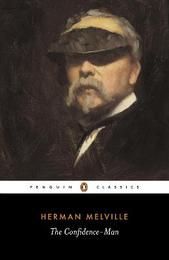
|
The Confidence-man
Paperback / softback
Main Details
| Title |
The Confidence-man
|
| Authors and Contributors |
By (author) Herman Melville
|
|
Edited by Stephen Matterson
|
|
Introduction by Stephen Matterson
|
|
Notes by Stephen Matterson
|
| Physical Properties |
| Format:Paperback / softback | | Pages:400 | | Dimensions(mm): Height 198,Width 129 |
|
| Category/Genre | Classic fiction (pre c 1945) |
|---|
| ISBN/Barcode |
9780140445473
|
| Classifications | Dewey:813.3 |
|---|
| Audience | |
|---|
|
Publishing Details |
| Publisher |
Penguin Books Ltd
|
| Imprint |
Penguin Classics
|
| Publication Date |
28 February 1991 |
| Publication Country |
United Kingdom
|
Description
Onboard the Fidele, a steamboat floating down the Mississippi to New Orleans, a confidence man sets out to defraud his fellow passengers. In quick succession he assumes numerous guises - from a legless beggar and a worldly businessman to a collector for charitable causes and a cosmopolitan' gentleman, who simply swindles a barber out of the price of a shave. Making very little from his hoaxes, the pleasure of trickery seems an end in itself for this slippery conman. Is he the Devil? Is his chicanery merely intended to expose the mercenary concerns of those around him? Set on April Fool's Day, The Confidence-Man (1857) is an engaging comedy of masquerades, digressions and shifting identity, and a devastating satire on the American dream.
Author Biography
Herman Melville (1819-91) became in his late twenties a highly successful author of exotic novels based on his experiences as a sailor - writing in quick succession Typee, Omoo, Redburn and White-Jacket. However, his masterpiece Moby-Dick was met with incomprehension and the other later works which are now the basis of his reputation, such as Bartleby, the Scrivener and The Confidence-Man, were failures. Melville stopped writing fiction and the rest of his long life was spent first as a lecturer and then, for nineteen years, as a customs official in New York City. He was also the author of the immensely long poem Clarel, which was similarly dismissed. At the end of his life he wrote Billy Budd, Sailor which was published posthumously in 1924.
Reviews"The great transcendental satire." -Carl Van Vechten
|